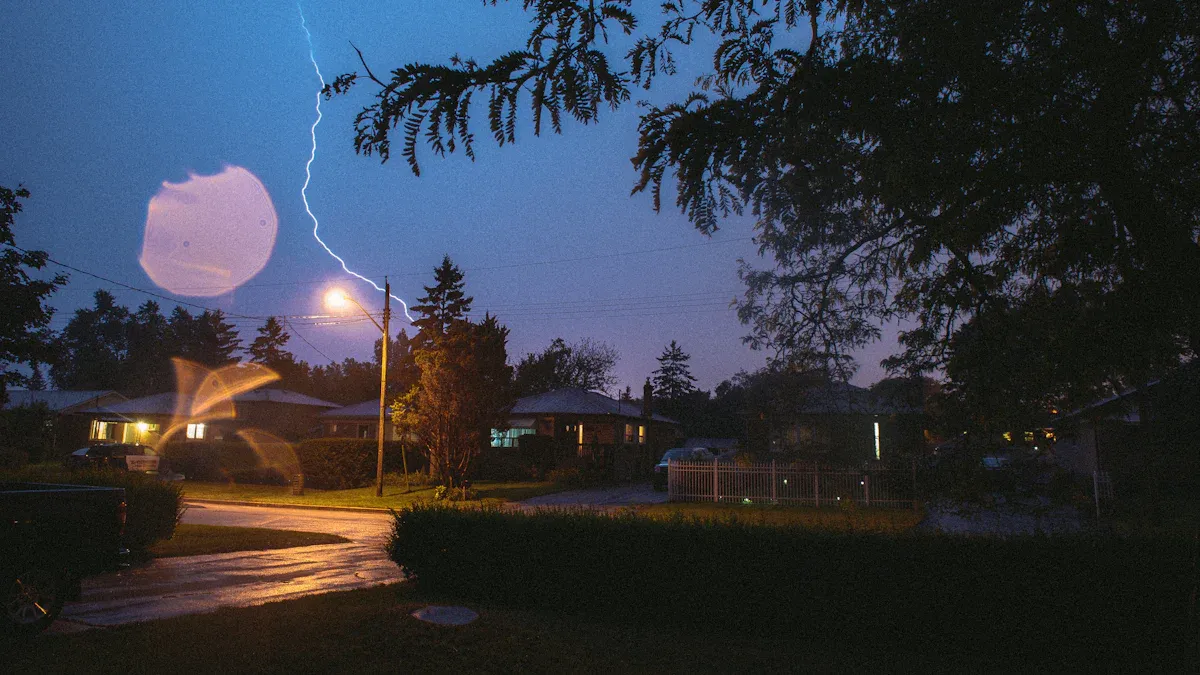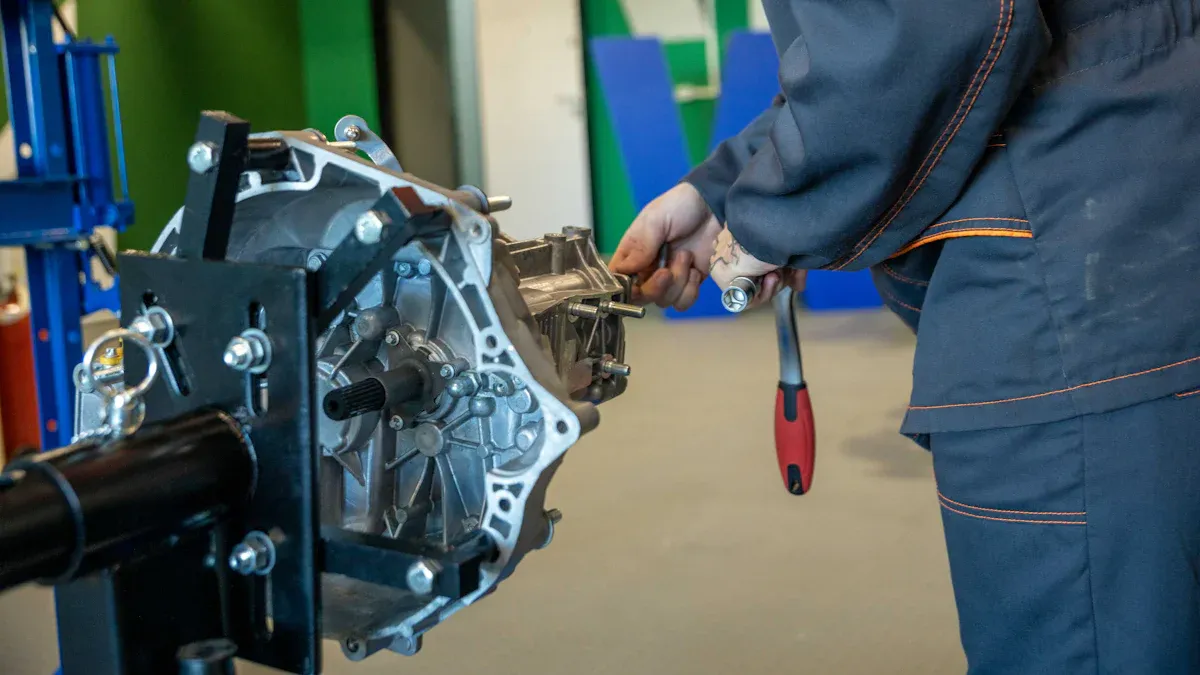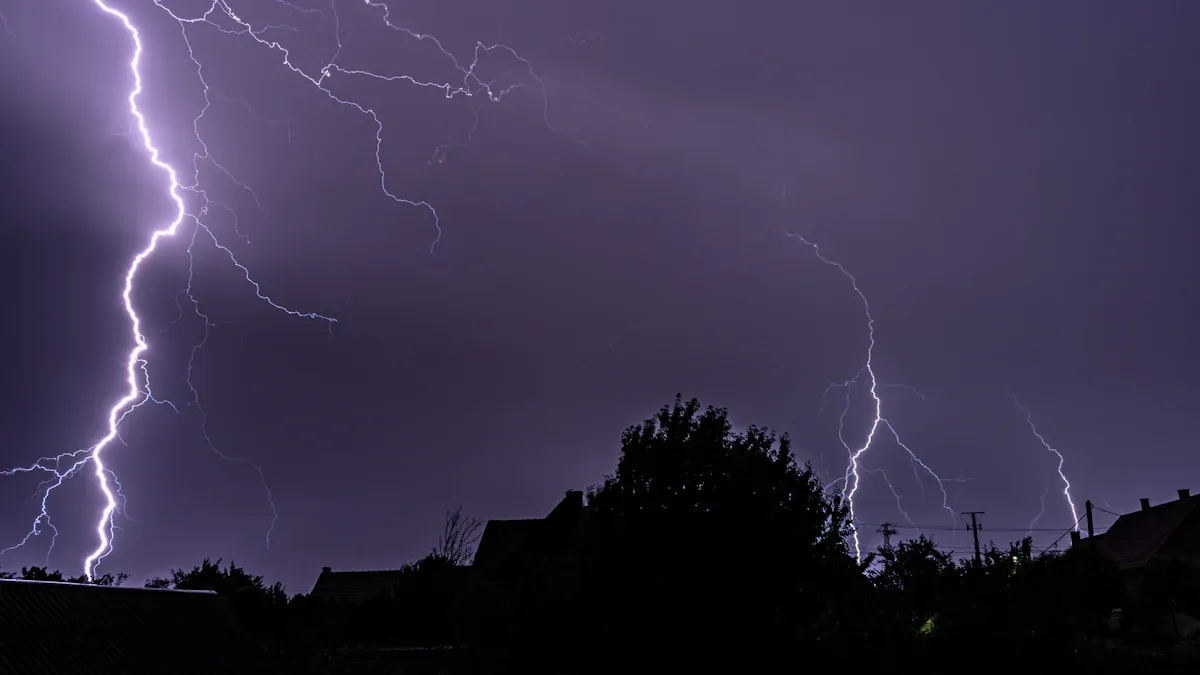
You want to feel safe when storms come to Beaufort County. Lately, lightning has damaged many home systems. If you’re worried about costly repairs, you might be asking, what is equipment breakdown coverage on my home insurance? How does it work? This coverage helps protect your appliances and systems from sudden electrical damage.
Key Takeaways
Equipment breakdown coverage helps protect your home’s main systems and appliances. It covers sudden electrical or mechanical problems, like those from lightning or power surges.
This coverage works with your homeowners insurance. It costs a small fee each year. It helps you avoid big repair bills for things like HVAC, refrigerators, and smart home devices.
Living in Beaufort County means there is more risk from lightning. Adding this coverage can help you worry less. It gives you money help if storms damage your home systems.
What Is Equipment Breakdown Coverage?

How It Works
You might wonder, what is equipment breakdown coverage? How does it help you? This coverage helps protect your home’s main systems. If something breaks suddenly, like a power surge ruining your fridge or a short stopping your HVAC, this coverage helps. You pay a small fee each year, usually $25 to $50. If you need to use it, you pay a deductible. The insurance pays for fixing, checking, or replacing covered things. This can include your heating and cooling, kitchen appliances, water heater, and electrical panel.
Tip: This insurance stays active as long as your homeowners insurance does. You do not need to renew a separate contract every year.
Why It’s Different from Standard Insurance
Standard homeowners insurance covers things like fire, theft, or storms. It does not pay for most things that break inside your home. If your dishwasher stops because of a mechanical problem, you pay for it yourself. Equipment breakdown coverage helps with these sudden problems. It covers sudden, accidental failures in your home’s systems. It does not pay for things that break from old age or bad care. You can feel better knowing you have help for big, surprise repairs.
Equipment breakdown coverage is not the same as car mechanical breakdown insurance, but it works like that for your home.
You get more protection than a home warranty, and you do not get surprise repair bills.
If you want to keep your home’s systems safe from sudden breakdowns, equipment breakdown coverage is a smart and cheap extra.
What Is Equipment Breakdown Coverage on My Home Insurance? How Does It Work?
Key Features
You might ask, what is equipment breakdown coverage? How does it work? This extra coverage protects your home’s main systems from sudden problems. It is not like a home warranty. This coverage stays active as long as your home insurance does. You do not need to sign a new contract every year.
Here are the main things you get with equipment breakdown coverage:
Your appliances and home systems are protected if they break from a sudden mechanical or electrical problem.
The coverage lasts as long as your home insurance is active and renewed.
You do not have to keep track of a separate contract. Home warranties only last one year and need to be renewed.
Insurance companies check what equipment you have and how you use it. They help you pick the right coverage.
You get help if big appliances like your HVAC, fridge, or water heater stop working all of a sudden.
Note: In South Carolina, most claims are for broken pumps, failed compressors, burned-out motors, burst pipes, and electrical problems like power surges. These issues can cost a lot if you do not have the right coverage.
Coverage Duration and Cost
You want your protection to last a long time. Equipment breakdown coverage stays active as long as your home insurance is in force. This means you do not have to worry about renewing a separate contract every year.
Let’s see what you pay and what you get:
Coverage Aspect | Details |
|---|---|
Deductible | $500 |
Coverage Options | $25,000 and $50,000 |
Expediting Expenses | Up to $2,500 |
Spoilage Coverage | Up to $2,500 |
Pollutant Clean-Up | Up to $2,500 |
You usually pay $25 to $50 each year for this coverage. If you file a claim, you pay a $500 deductible. The insurance company pays for repairs or replacement up to your limit. This can save you a lot if something big breaks.
Homes in Beaufort County use a lot of new technology. You might have smart thermostats, fancy kitchen appliances, and complex HVAC systems. These things make life easier, but they can break and cost a lot to fix. Equipment breakdown coverage helps protect your investment in these things.
Tip: If you want to avoid big repair bills and keep your home working well, adding equipment breakdown coverage is a good idea.
Now you know what equipment breakdown coverage is and how it works. It gives you affordable, long-lasting protection for the systems you use every day. You can feel safe knowing your insurance will help if something goes wrong.
Home Systems at Risk from Lightning

Vulnerable Equipment
Lightning can hit your home very quickly. It can cause a lot of trouble. You use many systems every day, but some are in more danger during storms:
HVAC systems (heating and cooling units)
Kitchen appliances (refrigerators, ovens, dishwashers)
Electrical panels and circuit breakers
Water heaters and well pumps
Home electronics (TVs, computers, gaming consoles)
Smart home devices (thermostats, security cameras, Wi-Fi routers)
One lightning strike or power surge can break these things fast. You might lose your air conditioning when it is hot. Your fridge could stop, and your food could spoil. Smart home devices and electronics are very easy to damage. Even a small surge can ruin their parts.
Tip: Surge protectors and whole-house surge devices can help. But they cannot stop all lightning damage. Insurance coverage gives you more peace of mind.
Local Lightning Risks
Beaufort County gets a lot of lightning strikes. The National Weather Service says this area has the most cloud-to-ground lightning in South Carolina. Bad storms bring lightning, strong winds, and heavy rain. These things make your home’s systems more likely to break.
Recent storms in Bluffton and Hilton Head caused:
Power outages and surges in places like Martingale West and Mainland Lakes Drive
Smoke and damage inside homes
Outdoor fires along Okatie Highway and Hunting Lodge Road
Fire departments came fast, but repairs still cost a lot. You cannot change the weather, but you can protect your home’s systems. Equipment breakdown coverage helps you fix things faster and saves you from big bills when lightning hits.
What’s Covered
Covered Systems and Appliances
You want to know what equipment breakdown coverage protects. This coverage helps many important systems and appliances in your home. It protects them if they suddenly stop working from electrical or mechanical problems. Here are some things that are covered:
Kitchen appliances like refrigerators, ovens, dishwashers, microwaves, and freezers
Washers and dryers
Electrical panels and home wiring
Smart home technology and security systems
Computers, televisions, and home entertainment equipment
Pool and jacuzzi equipment
Solar panels and gym equipment
You spend a lot of money on these systems. If they break, fixing or replacing them can be very expensive. With this coverage, you do not have to pay huge bills yourself.
Lightning and Power Surge Scenarios
Lightning and power surges can damage your home very fast. Imagine a storm comes to Beaufort County. Lightning hits close to your house. Suddenly, your HVAC, refrigerator, and smart thermostat stop working. A power surge can break your computer and security system. Equipment breakdown coverage helps you fix things quickly.
This coverage pays for repairs or new equipment if lightning or surges hurt your systems. You can feel calm knowing your insurance will help with these surprises.
Here is what you do if lightning causes damage:
Tell your insurance company about the damage right away.
Take pictures, write down what broke, and save your receipts.
An adjuster will come to your house to look at the damage.
Give all the details when you file your claim.
If your claim is approved, you get money to fix or replace your things.
Tip: Always act quickly and keep good records. This makes it easier to get help from your coverage.
What’s Not Covered
Exclusions
You should know what equipment breakdown coverage does not help with. This coverage helps if something breaks suddenly and by accident. But it does not cover every problem. Here are things that are not covered:
Problems from rust, corrosion, or erosion
Issues from settling, shrinking, or expanding of equipment
Normal wear and tear or slow breakdowns
Damage because you did not take care of your equipment
Problems that were there before you got the coverage
Remember, this coverage only helps with sudden failures. If your system gets worse over time, you pay for repairs. Insurance will not pay for damage from storms or floods.
Note: Doing regular maintenance keeps your equipment working well. It also helps you avoid having your claim denied.
Common Misconceptions
Many people think their regular insurance covers equipment breakdowns. That is not true. You need special coverage for these problems. Some people think only big failures are covered, but small breakdowns like a broken HVAC part can also count.
Here are some things people get wrong:
You may think all claims are hard to file, but most are easy if you keep good records.
Some believe if one claim is denied, future claims will be denied too. Each claim is checked on its own.
Many think wear and tear is covered. Only sudden breakdowns are covered.
Some worry their price will go up after a claim. Premiums depend on your whole claims history.
You protect your home best when you know what your coverage includes and what it does not.
Is Equipment Breakdown Coverage Worth It?
Pros and Cons
You want to make smart choices for your home. Adding extra protection can feel confusing, but weighing the good and the bad helps. Here are some points to consider:
You get help paying for sudden breakdowns of your HVAC, appliances, or home electronics.
You protect yourself from big repair bills after power surges or lightning strikes.
This coverage fills gaps left by standard homeowners insurance.
You do not have to worry about surprise costs when your systems fail.
However, you should know the drawbacks:
This coverage does not pay for normal wear and tear.
You must keep up with regular maintenance, or your claim could be denied.
It will not cover damage from floods, fires, or neglect.
Tip: If you live in Beaufort County, storms and lightning make your home’s systems more likely to break. This extra protection can save you money and stress.
Cost vs. Savings
You want to know if the cost makes sense. The yearly price for this coverage usually starts at $50 and can go up to $150. That is much less than what you might pay to fix or replace a major system. For example, a new HVAC can cost up to $14,000. Even a refrigerator can cost $1,800 or more. If lightning damages your home entertainment system, you could face a $5,000 bill.
Equipment Type | Average Repair/Replacement Cost |
|---|---|
Home entertainment systems | $5,000 |
Major appliances | $1,800–$20,000 |
HVAC systems | $2,000–$14,000 |
Solar panels | $10,000–$50,000 |
Imagine a storm knocks out your fridge and you lose all your food. This coverage can help pay for repairs and even spoiled groceries, as long as you keep good records. You avoid paying thousands out of pocket for one small yearly fee.
Note: You protect your budget and your peace of mind when you add this coverage to your policy.
Should You Add It? Decision Guide
Checklist
You want to make the right choice for your home. Use this checklist to see if adding extra protection makes sense for you:
You own expensive appliances or smart home devices.
Your home has a newer HVAC, solar panels, or a backup generator.
You live in an area with frequent storms or lightning strikes.
You want to avoid paying thousands for sudden repairs.
You want peace of mind knowing your home insurance policy covers more than just fire or theft.
You keep up with regular maintenance on your home systems.
If you checked two or more boxes, you should seriously consider adding this protection.
Questions for Your Agent
Before you decide, talk to your insurance agent. Ask these questions to make sure you get the best coverage for your needs:
How does my home insurance policy cover lightning damage, including fires, surges, and falling trees?
Does my policy pay for damage to appliances or systems from electrical or mechanical failure?
Is equipment breakdown coverage available as an add-on? What does it include?
What are the coverage limits and deductible amounts?
How do I file a claim for lightning or surge damage? What documents do I need?
Are there any exclusions, like neglect or lack of maintenance?
What preventive steps do you recommend, such as surge protectors or whole-home lightning systems?
Will regular maintenance affect my eligibility for claims?
Write down your answers. This helps you compare options and choose the best protection for your home.
You should add this coverage if you rely on modern systems, live in a storm-prone area, or want to avoid big repair bills. You may skip it if your home has few electronics or you already have strong protection in place.
You keep your home safer when you have equipment breakdown coverage. Standard insurance pays for damage if lightning hits your house. But it does not pay if a power surge or breakdown happens. Look at the table below to see the difference:
Coverage Type | Lightning-Related Protection |
|---|---|
Standard Homeowners | Only pays for damage from a direct lightning strike |
Equipment Breakdown | Pays for surges, motor burnout, and electrical failures caused by lightning |
Talk to your agent and check your policy. This helps you find any missing coverage and keeps your home protected.
FAQ
What if I already have a home warranty?
Equipment breakdown coverage gives you better protection. Home warranties sometimes do not pay for everything. They may say no to your claim or pay less. Pick coverage that helps you when you really need it.
Does equipment breakdown coverage pay for old equipment?
No. This coverage only helps if something breaks by accident. It does not pay for things that get old or worn out. Take care of your equipment to keep it working well.
How do I file a claim after lightning damage?
Call your insurance agent as soon as you can.
Take pictures of everything that got damaged.
Keep all your receipts safe.
Acting fast helps you get your money sooner.
